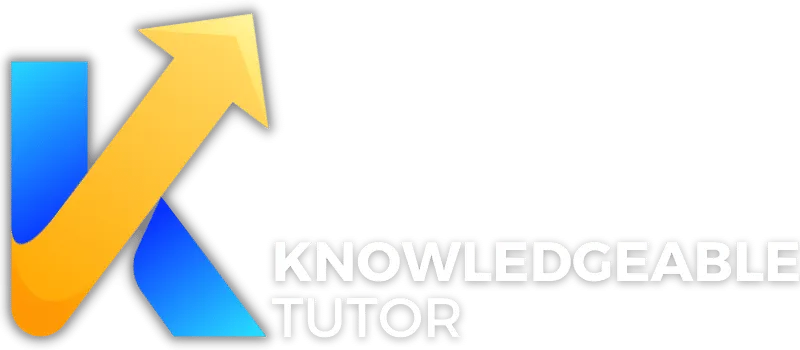The Comprehensive Guide on How to Become an Online Tutor

Fanie Naude
CEO & Founder of Knowledgeable Tutor, Buznet Direct, YMC & Naude Consulting

Fanie Naude
CEO & Founder of Knowledgeable Tutor, Buznet Direct, YMC & Naude Consulting
The Comprehensive Guide on How to Become an Online Tutor is a meticulously crafted resource for aspiring and existing tutors who wish to navigate the burgeoning world of online education. From the historical evolution of e-learning to the latest tools and strategies, this guide offers a panoramic view of the virtual classroom. It delves into the practicalities of subject expertise, communication, engagement, marketing, and ethics, providing a roadmap for success in the digital age.
In This Article
- The Rise of Online Tutoring: Tracing the history and growth of e-learning, the impact of the pandemic, and the unique benefits of online tutoring.
- Understanding the Virtual Classroom: A detailed comparison of platforms and tools, essential elements like whiteboards and screen sharing, and tips for setting up a professional virtual teaching environment.
- Preparing to Teach Online: Emphasizing subject expertise, understanding curriculum standards, and the importance of certifications and continuous professional development.
- Effective Communication and Engagement: Strategies for building rapport with students, using multimedia and interactive content, and inspirational quotes from renowned educators.
- Marketing and Building Your Brand: Guidance on utilizing social media, content creation, blogging, and building a professional portfolio.
- Ensuring Quality in Online Tutoring: Focus on feedback, continuous improvement, ethics, and professionalism, along with visual representations and comparisons of essential elements and platforms.
This guide serves as a comprehensive manual for both novice and experienced tutors, offering insights, real-life examples, and practical tips to excel in the world of online tutoring. It's a treasure trove of information, reflecting the bright future of education in the digital era.

1. Introduction
Understanding Online Tutoring: Definition, Importance, and Growth in the Digital Age
Online tutoring, a method of teaching that occurs entirely over the Internet, has become a vital part of the educational landscape. It's a process where tutors and students connect in a virtual environment, using various tools and platforms to facilitate learning.
Definition: Online tutoring refers to the practice of providing personalized educational support to students through digital means. It can include one-on-one sessions, group classes, or asynchronous learning where students access materials at their convenience.
Importance: The significance of online tutoring has been magnified in the digital age. It breaks down geographical barriers, allowing students to access quality education from anywhere in the world. It also offers flexibility, catering to different learning styles and needs.
Growth: The online tutoring industry has seen exponential growth in recent years. According to Grand View Research, the global online tutoring market size was valued at USD 4.81 billion in 2019 and is expected to grow at a compound annual growth rate (CAGR) of 16.1% from 2020 to 2027.
Why Become an Online Tutor: Benefits and Opportunities
The decision to become an online tutor is often driven by a combination of passion for education and the numerous benefits it offers.
Benefits:
- Flexibility: Online tutors can set their schedules, allowing for a work-life balance.
- Wider Reach: Tutors can connect with students globally, not just in their local area.
- Personalized Learning: Technology enables tutors to tailor lessons to individual student needs.
- Cost-Effective: Reduced overhead costs compared to traditional tutoring.
Opportunities:
- Career Growth: The demand for online tutors is rising, offering opportunities for career advancement.
- Entrepreneurial Path: Tutors can build their tutoring business, leveraging marketing and branding.
- Specialization: Tutors can focus on niche subjects or cater to specific age groups or learning needs.
In the words of Benjamin Franklin, "An investment in knowledge pays the best interest." Becoming an online tutor is not just a career choice; it's a commitment to empowering others through education. It aligns with the mission of Knowledgeable Tutor to revolutionize the way education is delivered and experienced.

2. Assessing Your Skills and Qualifications
Educational Requirements: Degrees, Certifications, and Specializations
Becoming an online tutor requires a solid educational foundation. Here's what you need to consider:
- Degrees: A Bachelor's degree in the subject you wish to teach is often a minimum requirement. Some platforms may require a Master's degree or higher, especially for advanced subjects.
- Certifications: Certifications in teaching or specialized areas can enhance your credibility. For example, a TEFL certificate for teaching English as a foreign language.
- Specializations: Focusing on a niche or specialized area can set you apart. Whether it's STEM subjects, special needs education, or test preparation, specialization can be a unique selling point.
Technical Skills: Familiarity with Online Tools and Platforms
In the digital age, technical proficiency is paramount. Here's what you need:
- Platform Knowledge: Understanding different online tutoring platforms and how to navigate them.
- Software Skills: Familiarity with tools like video conferencing, whiteboards, and educational software.
- Troubleshooting: Ability to handle common technical difficulties during sessions.
Soft Skills: Communication, Empathy, and Time Management
Soft skills are the intangible qualities that make a great tutor. They include:
- Communication: Clear and effective communication is key to understanding student needs and explaining complex concepts.
- Empathy: Understanding and connecting with students on an emotional level helps in building trust and facilitating learning.
- Time Management: Planning lessons, managing time during sessions, and balancing tutoring with personal life are essential for success.
Table: Skills and Qualifications Overview
| Category | Details |
|---|---|
| Educational | Degrees, Certifications, Specializations |
| Technical | Platform Knowledge, Software Skills, Troubleshooting |
| Soft Skills | Communication, Empathy, Time Management |
As John Dewey once said, "Education is not preparation for life; education is life itself." The skills and qualifications outlined above are not just prerequisites for becoming an online tutor; they are the building blocks for creating a meaningful and impactful educational experience.
These requirements align with the challenges and needs of tutors as identified by Knowledgeable Tutor, particularly in navigating the shift to digital education and ensuring online tutoring quality. They form a comprehensive guide for aspiring tutors, ensuring they are well-equipped to embark on this rewarding career path.

3. Choosing Your Subject and Niche
Identifying Your Expertise: Subjects, Age Groups, and Special Needs
The first step in becoming an online tutor is identifying your areas of expertise. Here's how to do it:
- Subjects: What subjects are you passionate about and qualified to teach? It could be mathematics, science, languages, or arts.
- Age Groups: Different age groups require different teaching approaches. Are you more comfortable with young children, teenagers, or adults?
- Special Needs: Teaching students with special needs requires specialized training and empathy. If this is your calling, consider pursuing relevant certifications.
Market Research: Understanding Demand and Competition
Understanding the market is crucial for success. Here's what you need to research:
- Demand: What subjects are in high demand? For example, STEM subjects often have a higher demand.
- Competition: Who are your competitors? What do they offer, and how can you differentiate yourself?
- Trends: Stay updated with the latest educational trends, such as online tutoring for different age groups or special needs students.
List: Steps to Choose Your Subject and Niche
- Assess Your Strengths and Passions: What subjects do you excel in? What do you love teaching?
- Understand Your Target Audience: Who do you want to teach? Children, teenagers, adults, or special needs students?
- Conduct Market Research: Analyze demand, competition, and trends.
- Choose a Niche if Applicable: Specializing in a niche can set you apart. It could be test preparation, special needs education, or a specific subject area.
- Align with Your Goals and Values: Ensure that your chosen subject and niche align with your career goals and personal values.
As the famous educator Maria Montessori said, "The greatest sign of success for a teacher is to be able to say, 'The children are now working as if I did not exist.'" Choosing the right subject and niche is not just about your expertise; it's about creating an environment where students can thrive and learn independently.
By aligning your skills and passions with market demand, you position yourself for success in the competitive world of online tutoring. Whether you're teaching different subjects or focusing on online tutoring for special needs students, your choice will shape your tutoring journey and the impact you make on your students' lives.
The insights provided here align with the mission of Knowledgeable Tutor to empower tutors with cutting-edge e-learning tools and strategies. By choosing the right subject and niche, you're taking a significant step towards expanding your reach and enhancing student engagement.
Next, we'll delve into the technology and tools that will enable you to deliver top-notch online tutoring. Are you ready to explore this vital aspect of your tutoring career?

4. Technology and Tools
Selecting the Right Platform: Comparing Popular Online Tutoring Platforms
Choosing the right platform is a critical decision in online tutoring. Here's a comparison of some popular platforms:
| Platform | Features | Pricing | Best For |
|---|---|---|---|
| Zoom | Video conferencing, screen sharing, breakout rooms | Free to $19.99/month | General tutoring |
| Skype | Video calls, instant messaging, file sharing | Free | One-on-one sessions |
| Teachable | Course creation, quizzes, certificates | $29 to $399/month | Creating full-fledged online courses |
| Google Classroom | Assignments, grading, collaboration with Google Workspace | Free | Classroom management |
| Knowledgeable Tutor | Comprehensive e-learning solutions, student engagement tools | Custom Pricing | Professional tutors seeking an all-in-one solution |
Essential Tools: Hardware, Software, and Internet Requirements
To provide quality online tutoring, you'll need the right tools:
- Hardware: A computer with a good processor, webcam, microphone, and optionally a drawing tablet for interactive lessons.
- Software: Tools like Microsoft Office, PDF readers, and specialized software for subjects like mathematics or design.
- Internet: A stable and high-speed internet connection to ensure smooth video conferencing.
List: Essential Considerations for Selecting Technology and Tools
- Understand Your Needs: What are your teaching requirements? Do you need video conferencing, interactive whiteboards, or course creation tools?
- Evaluate Features: Compare platforms based on features like collaboration, interactivity, and ease of use.
- Consider Budget: Choose a platform that fits your budget without compromising essential features.
- Check Compatibility: Ensure that the platform is compatible with your computer and operating system.
- Prioritize Security: Select platforms that comply with privacy and security standards to protect both you and your students.
As Bill Gates aptly put it, "Technology is just a tool. In terms of getting the kids working together and motivating them, the teacher is the most important." While technology plays a vital role, your skills and dedication are what truly make a difference.
By selecting the right platform and tools, you align with the vision of Knowledgeable Tutor to revolutionize the way education is delivered and experienced. You ensure that you have the resources and knowledge to excel in the digital age, enhancing teaching quality and student outcomes.
Real-life examples of tutors successfully utilizing these tools can be found in various case studies on the Knowledgeable Tutor platform. These stories provide insights into how technology can be leveraged to create engaging and effective online tutoring sessions.
The next section will guide you through designing your online tutoring program, a critical step in your journey to becoming a successful online tutor. Are you prepared to take this exciting step?

5. Designing Your Online Tutoring Program
The design of your online tutoring program is the heart of your educational offering. It's where your expertise, creativity, and understanding of your students' needs come together to create a learning experience that's both engaging and effective. Let's delve into the essential components of designing your online tutoring program.
Curriculum Development: Creating Engaging and Effective Lessons
Understanding Your Students' Needs: Before you start developing your curriculum, it's essential to understand your students' needs, goals, and learning styles. Tailoring your lessons to meet these needs will make your program more effective. You can find more insights on this at Understanding Different Online Tutoring Platforms.
Setting Clear Objectives: Define what you want your students to achieve by the end of the course. Break down these objectives into smaller, manageable goals for each lesson.
Incorporating Multimedia: Utilize videos, images, and interactive elements to make your lessons more engaging. This approach aligns with the modern learner's preference for visual and interactive content.
Creating Effective Lesson Plans: Plan each lesson carefully, ensuring that it aligns with the overall objectives of the course. For more on this, explore Creating Effective Lesson Plans for Online Tutoring.
Interactive Strategies: Utilizing Multimedia, Quizzes, and Interactive Sessions
Interactive Multimedia: Incorporate videos, animations, and interactive simulations to explain complex concepts. This can make learning more engaging and enjoyable.
Quizzes and Assessments: Regular quizzes and assessments help in gauging student understanding and provide immediate feedback.
Live Interactive Sessions: Live sessions allow for real-time interaction, questions, and discussions. They can foster a sense of community and engagement among students.
Tools for Engagement: Consider using tools that allow for collaborative activities, such as shared whiteboards or breakout rooms. More on this can be found at Tools and Technology for Effective Online Tutoring.
Assessment and Feedback: Measuring Student Progress and Providing Constructive Feedback
Ongoing Assessments: Regular assessments help in tracking student progress and identifying areas that might need more attention.
Providing Timely Feedback: Constructive feedback helps students understand what they are doing well and where they need to improve. It's a critical part of the learning process.
Utilizing Technology for Assessment: Many online platforms offer tools for creating and managing assessments, making this process more streamlined and efficient.
Measuring Success: Understanding how to measure your success as an online tutor can be found at How to Measure Your Success as an Online Tutor.
Real-Life Example: Khan Academy
Khan Academy is a well-known example of an online education platform that has successfully implemented these principles. They offer a wide range of subjects and utilize interactive videos, quizzes, and personalized dashboards to empower learners to study at their own pace.
"The function of education is to teach one to think intensively and to think critically. Intelligence plus character – that is the goal of true education." - Martin Luther King, Jr.

6. Marketing and Branding
The digital age has revolutionized the way tutors market and brand themselves. In the realm of online tutoring, where the competition is fierce, a well-thought-out marketing and branding strategy can be the difference between success and obscurity. Here's how you can build your online presence, network, and set pricing strategies.
Building Your Online Presence
- Website Creation: Your website is your digital storefront. It's where potential students and their parents will first encounter your services. Consider using platforms like WordPress or Wix to create a professional-looking website. Include essential information such as your qualifications, subjects you tutor, testimonials, and contact details. Here's a guide on building your online tutoring business tips and strategies.
- Social Media Engagement: Platforms like Facebook, Twitter, and LinkedIn are powerful tools for reaching a wider audience. Share valuable content, engage with your followers, and showcase your expertise. Learn more about using social media for your online tutoring business.
- Content Marketing: Regularly publishing blogs, videos, or podcasts can establish you as an authority in your field. Topics could range from study tips to subject-specific insights. Here's how to market yourself as an online tutor.
Networking and Collaboration
- Connecting with Other Tutors: Collaborating with other tutors can expand your reach and offer cross-promotion opportunities. Platforms like LinkedIn are great for professional networking.
- Partnerships with Educational Institutions: Building relationships with schools and colleges can lead to referrals and a steady stream of students.
- Online Communities: Participate in online forums and groups related to education. Share your insights and connect with potential clients.
Pricing Strategies
- Understanding Your Value: Assess your qualifications, experience, and the unique value you bring to set a fair price. Here's a guide on online tutoring rates and how to price your services.
- Competitive Analysis: Research what other tutors in your subject and region are charging. Stay competitive without undervaluing your services.
- Flexible Pricing Models: Offer different packages, discounts for bulk lessons, or a sliding scale based on the student's needs.
Real-Life Example: Case Study
SuperProf, a global tutoring platform, leveraged social media advertising and SEO strategies to grow its user base. They also implemented a flexible pricing model, allowing tutors to set their rates, thus attracting a diverse range of educators.
The Words of Wisdom
As Philip Kotler, the father of modern marketing, once said, "Marketing takes a day to learn. Unfortunately, it takes a lifetime to master." The journey of marketing and branding your online tutoring business is continuous and ever-evolving. Stay abreast of the latest trends, be authentic in your approach, and never underestimate the power of networking. The future of online tutoring is bright, and with the right marketing strategies, you can shine in this thriving industry.

7. Legal and Ethical Considerations
In the realm of online tutoring, legal and ethical considerations are paramount. They form the backbone of trust and integrity in the e-learning environment. This section will delve into the critical aspects of compliance with laws, privacy, and security, which are essential for every online tutor.
Compliance with Laws: Understanding Legal Requirements
Online tutoring is governed by various laws and regulations that vary by jurisdiction. It's vital to understand and comply with these legal requirements to operate legitimately.
Licensing and Certification: Depending on the region and subject matter, tutors may need specific licenses or certifications. For example, teaching a foreign language might require certification from a recognized language institution.
Tax Regulations: Online tutors must adhere to tax laws in their country. This includes declaring income and understanding tax obligations related to self-employment.
Accessibility Laws: Ensuring that online tutoring services are accessible to students with disabilities is not only ethical but often legally required. For example, the Americans with Disabilities Act (ADA) mandates accessibility in the U.S.
Child Protection Laws: Tutors working with minors must comply with child protection laws, such as obtaining parental consent and ensuring a safe online environment.
Intellectual Property Rights: Using copyrighted materials without proper authorization can lead to legal issues. Tutors must ensure that they have the right to use all content in their lessons.
For a comprehensive understanding of legal requirements, tutors can refer to Ethical Practices in Online Tutoring.
Privacy and Security: Protecting Student Information
In the age of cyber threats, protecting student information is not only an ethical obligation but often a legal one. Here's how tutors can ensure privacy and security:
Data Protection Laws: Complying with data protection regulations like the General Data Protection Regulation (GDPR) in Europe is crucial. Tutors must understand how these laws apply to their operations.
Secure Platforms: Choosing secure platforms for online tutoring is essential. Platforms should have robust encryption and adhere to industry security standards. Understanding Different Online Tutoring Platforms offers insights into selecting the right platform.
Confidentiality Agreements: Tutors should have clear policies regarding the confidentiality of student information. This includes not sharing personal details without consent.
Cybersecurity Measures: Implementing cybersecurity measures such as firewalls, secure passwords, and regular software updates helps in protecting sensitive information.
Creating a Safe and Comfortable Online Learning Environment: Tutors must foster a safe online learning environment. Guidelines for this can be found at Creating a Safe and Comfortable Online Learning Environment.
Legal and ethical considerations are the cornerstones of a responsible and successful online tutoring practice. As Benjamin Franklin wisely said, "Justice will not be served until those who are unaffected are as outraged as those who are." Compliance with laws and a strong commitment to privacy and security not only protect tutors and students but also enhance the reputation and credibility of the online tutoring profession.
The future of online tutoring is indeed bright, but it requires a conscientious approach where legal and ethical considerations are not an afterthought but an integral part of the tutoring process. By adhering to these principles, tutors can provide a secure, lawful, and ethical learning experience, laying the foundation for a thriving online tutoring career.

8. Continuous Professional Development
In the ever-evolving landscape of online education, continuous professional development (CPD) is not just a choice but a necessity for online tutors. The digital age demands constant growth, adaptation, and innovation. As John F. Kennedy once said, "Leadership and learning are indispensable to each other." In the context of online tutoring, this rings especially true.
8.1 Staying Updated: Following Industry Trends and Continuous Learning
- Understanding Emerging Technologies: Embrace new tools and technologies that enhance the online tutoring experience. Stay abreast of the latest trends through online forums, webinars, and professional networks.
- Adapting to Educational Paradigms: The methodologies of teaching are constantly evolving. Engage in lifelong learning to adapt to new educational paradigms and methodologies.
- Participation in Workshops and Conferences: Regularly attend workshops, conferences, and seminars that focus on online education. This not only enhances your skills but also provides opportunities to network with industry experts.
- Online Courses and Certifications: Enroll in online courses that focus on e-learning strategies, digital marketing, or subject-specific enhancements.
8.2 Joining Professional Networks: Benefits of Associations and Online Communities
- Professional Associations: Joining associations dedicated to online education can provide access to resources, training, and a community of like-minded professionals.
- Online Communities and Forums: Engaging in online communities allows for the exchange of ideas, best practices, and collaboration with other tutors.
- Mentorship Opportunities: Finding a mentor or becoming one can be a rewarding way to grow professionally. Mentorship fosters a culture of continuous learning and support.
Real-Life Example
The International Society for Technology in Education (ISTE) is a prominent example of a professional network that offers resources, community, and advocacy for technology in education. Many online tutors have benefited from ISTE's conferences, publications, and professional learning networks.
8.3 The Importance of Self-Care and Balance
- Work-Life Balance: Managing your time effectively is essential. Consider strategies for effective time management to ensure a healthy work-life balance.
- Mental Health Considerations: Online tutoring can be demanding. Focus on maintaining your mental health through mindfulness practices, hobbies, and regular breaks.
- Physical Health: Don't overlook the importance of physical well-being. Regular exercise, proper ergonomics, and healthy eating contribute to overall success.

9. Real-Life Case Studies
Real-life case studies are the heart and soul of understanding the practical aspects of online tutoring. They provide a window into the real world, showcasing the triumphs and tribulations of tutors who have ventured into the digital realm. Let's delve into the success stories and challenges, and how they were overcome.
The digital age has brought forth a plethora of opportunities for tutors to expand their reach and enhance their teaching methodologies. The transition from traditional to online tutoring is not just a trend but a significant shift that has been embraced by many educators around the world. Here are some real-life case studies and success stories that showcase the triumph of online tutoring:
10 Tutoring Business Success Stories [2023] - Starter Story: This collection of case studies demonstrates how ordinary people have built successful tutoring businesses, reaching millions in revenue. These stories are not just inspirational but provide a roadmap for aspiring tutors.
Online Tutor 2.0: Methodologies and Case Studies for Successful Learning: This publication on ResearchGate explores successful cases in online education, focusing on methodologies and strategies that have proven effective in the learning process.
Case Studies and Stories of Private Tutoring: A+ Tutoring provides a detailed analysis of real client problems and the solutions they have provided. These case studies range from elementary school through college planning, offering insights into various educational levels.
6 Online Tutors Business Success Stories [2023] - Starter Story: Here, you'll find real-life success stories of starting an online tutors business. These stories are not only motivational but provide a glimpse into the entrepreneurial side of online tutoring.
Online Tutor 2.0: Methodologies and Case Studies for ... - IGI Global: This chapter presents a case study of a training course involving Italian early-secondary school teachers, focusing on online tutors' activities and methodologies.
These case studies are a testament to the power of online tutoring and the impact it can have on both educators and students. They reflect the vision of a future where education is not confined to physical boundaries but transcends them to reach learners across the globe.
As the famous educator John Dewey once said, "Education is not preparation for life; education is life itself." These success stories embody this philosophy, showcasing how online tutoring has become a vital part of the educational landscape.
For tutors and educators who are proactive in learning and adopting new tutoring tools, these case studies provide valuable insights and inspiration. They highlight the need for simplified online course creation and delivery tools, effective digital marketing strategies, and assurance of enhanced online student engagement.
The future indeed looks bright for online tutoring, and these real-life examples pave the way for more success stories to emerge.
Conclusion
The journey through the multifaceted world of online tutoring has been both enlightening and inspiring. As we stand at the threshold of a new era in education, the role of online tutoring continues to gain prominence, shaping the way we teach and learn.
The Future of Online Tutoring: Trends and Predictions
Online tutoring is not merely a temporary solution or a fleeting trend; it's a robust educational paradigm that's here to stay. With the advent of cutting-edge technologies, the scope of online tutoring is expanding, encompassing not just traditional subjects but also specialized fields and niche areas. Artificial Intelligence, Virtual Reality, and personalized learning paths are some of the exciting trends that are set to redefine the future of online tutoring.
The words of Nelson Mandela resonate profoundly in this context: "Education is the most powerful weapon which you can use to change the world." Online tutoring is indeed a powerful tool, democratizing education and making it accessible to all, irrespective of geographical boundaries.
Call to Action: Encouraging Readers to Take the Next Step
For tutors and educators who are eager to embrace the digital age, the path is clear and the opportunities are boundless. From understanding the essence of online tutoring to assessing skills, choosing the right niche, leveraging technology, designing effective programs, marketing, legal considerations, and continuous professional development, the roadmap has been laid out.
The real-life case studies and success stories are a testament to what's achievable. They are not just stories but beacons guiding the way, illuminating the path for others to follow.
Now, the onus is on you, the aspiring online tutor. The future is bright, and the world is waiting for your unique contribution. Take the leap, invest in the platforms that enhance student engagement, and embark on a fulfilling journey to educate, empower, and inspire.
As the renowned philosopher and educator, John Dewey aptly put it, "If we teach today's students as we taught yesterday's, we rob them of tomorrow." The future of education is online, and it beckons you to be a part of this exciting revolution.

